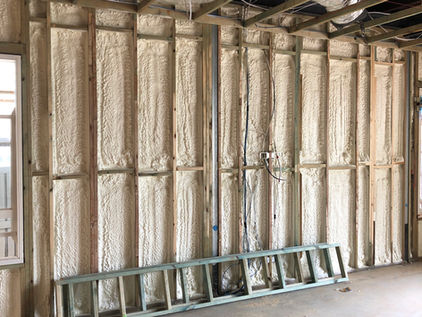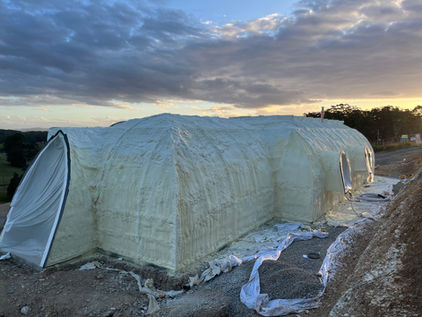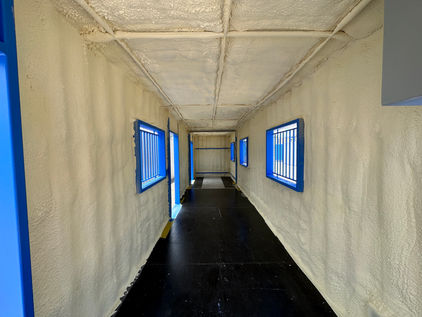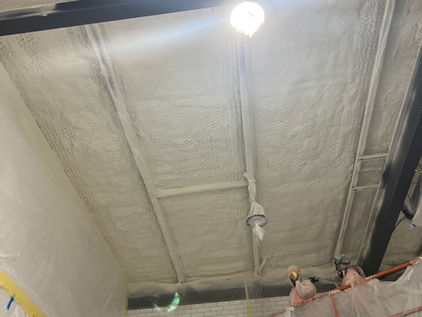



Building Code Marked Certified
0.0022 W/mk
to ASTM C518
Water absorption <3%
ASTM D2842
>95% Closed Cell Content
ASTM D6226
Fire Rated to AS1530_3
Group 3 Classification
AS3837
Compressive Strength
>80 kPa
AS 2498.3
Core Density 34kg/m2
ASTM D1622
Our Products. Industry leading insulation solutions.
Spray Polyurethane Foam (SPF) insulation is a highly effective solution for meeting the National Construction Code (NCC) insulation requirements in Australia. Here's how SPF insulation contributes to achieving these requirements with ease:
-
High Thermal Performance: SPF insulation offers superior thermal resistance (high R-value) compared to traditional insulations. This means it is highly effective in reducing heat transfer, thereby significantly enhancing the energy efficiency of buildings. The higher the R-value, the better the insulation's effectiveness, and SPF typically provides higher R-values per inch of thickness than many other insulation materials.
-
Air Sealing Properties: One of the unique attributes of SPF is its ability to create an air-tight seal. Air leakage can significantly impact a building's thermal performance. SPF expands to fill gaps, cracks, and crevices, forming a continuous barrier against air and moisture infiltration. This helps in maintaining consistent indoor temperatures and reducing the load on heating and cooling systems.
-
Moisture Control: SPF insulation provides an effective moisture barrier. By controlling moisture ingress, it helps in preventing problems like mold and mildew growth, which can affect the structural integrity of the building as well as indoor air quality.
-
Versatility and Adaptability: SPF can be applied to various areas of a building, including hard-to-reach spaces such as attics, crawl spaces, and rim joists. Its ability to conform to any shape and fill irregular spaces makes it an ideal solution for complex architectural designs.
-
Durability: SPF insulation is known for its long lifespan. It does not settle or degrade over time, maintaining its insulating properties for many years. This long-term reliability can be crucial for meeting and maintaining NCC requirements over the lifespan of a building.
-
Contribution to Sustainable Building Practices: By improving energy efficiency and reducing the carbon footprint of buildings, SPF insulation aligns with the principles of sustainable construction. It supports the NCC's focus on energy-efficient building practices.
-
Compliance with Fire Safety Standards: Modern SPF products are formulated to meet fire safety standards, which is a critical aspect of NCC compliance. They are often treated with fire retardants to reduce flammability.
-
Ease of Installation: SPF application is relatively quick and can be less labor-intensive compared to installing traditional insulation materials, leading to reduced construction times and costs.
In summary, SPF insulation's superior thermal performance, air sealing properties, moisture control, and versatility make it an excellent choice for achieving NCC insulation requirements. Its ability to adapt to various building designs and contribute to long-term energy efficiency makes it a preferred insulation method in modern construction.
Industry Links
AMBA is an interest group of companies established to represent the use of polymers in the Australian construction industry. Polymer-based materials are increasingly used in building and construction to make our buildings more sustainable and energy efficient.
As innovation drives new applications, AMBA will engage with construction industry stakeholders and regulators to ensure the use of polymers contributes to buildings that are safe, enduring and efficient.
The EEC is the peak body for Australia’s energy management sector. A not-for-profit membership association, EEC works to:
• Drive world-leading policy on efficiency, electrification and demand flexibility;
• Ensure we have the skilled workforce to deliver Australia’s energy transition; and
• Support businesses and households to rapidly decarbonise.

Our Services. Where you can use spray foam insulation.
Notable Projects. Where we have used spray foam.

Unique Project Solutions
We are not a one size fits all company. We look at the best options for any project.
Which is why we use insulation batts, cavity wall insulation, and other products depending on the project needs.
As part of the Energy Efficiency Group we are a National Australian company specialising in delivering world leading insulation products and services for any application.

#InsulationBatts
#InsulationRemoval

































































